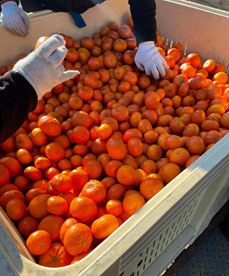 In the microclimate of Lynedoch, between Stellenbosch and Kuils River, a wine farm harvests their mandarins so late that the facility where they pack, remains open just for them.
In the microclimate of Lynedoch, between Stellenbosch and Kuils River, a wine farm harvests their mandarins so late that the facility where they pack, remains open just for them.
Wine is still produced from fifty hectares of vineyards (cabernet franc and chenin blanc the best-producing among the eleven varieties of wine grapes grown for the Carinus wine label) but they would definitely like to expand their citrus acreage by another 20% at least, says Bluegum Grove farm manager Francois Alberts. He remarks that Tango sapling supply is tight at the moment, though.
Tango orchards were first established here over a decade ago when Boland wine farmers were starting to take notice of the high potential of late mandarins. On this farm they made the felicitous discovery that they could manipulate their Tango crop two weeks either way. "A few pack sheds and marketers have come around: everyone wants our fruit because we're about two weeks after the market has finished. Everyone's done picking mandarins by the time we start."
This year the first round of Tango harvesting started at the middle of August, followed by an interval waiting for colour and internals to develop before a second round of harvesting. Last week the trees were finally stripped of the final late mandarins, mostly marketed in the United States.
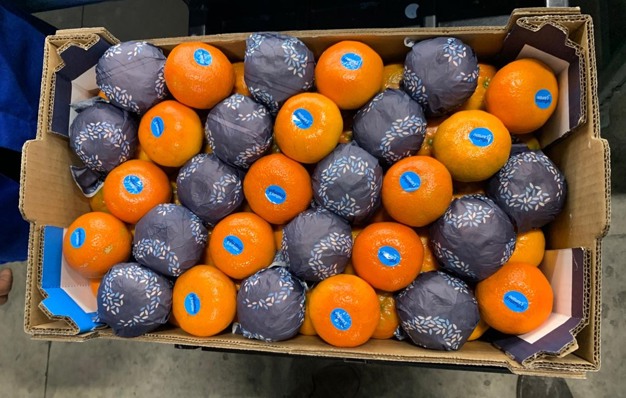
Among the very last of South Africa's late mandarin crop, here packed in the Nature's Triumph brand
"In our orchards the fruit for next season has already set before we even got this season's fruit off. You have to be delicate during picking that you're not bumping off the flowers."
Current season makes up for terrible thrips (and avian flu) in 2023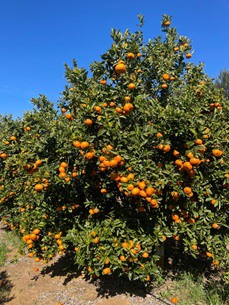 They had taken out lemons to make way for the Tango orchards which they now regret, he says, but exactly two years ago they re-established Eureka lemons. Although these are seeded lemons, the sterile pollen of the seedless late mandarins inhibits cross-pollination and seed formation in the lemons on the farm.
They had taken out lemons to make way for the Tango orchards which they now regret, he says, but exactly two years ago they re-established Eureka lemons. Although these are seeded lemons, the sterile pollen of the seedless late mandarins inhibits cross-pollination and seed formation in the lemons on the farm.
"We let bees in freely, and we have a honey producer who puts his beehives around our orchards. The Tangos don't need to be pollinated but it's good for the environment. We try to limit our pesticides to encourage wildlife and other insects to come into the orchards and when you walk around on the farm, you always find butterflies and other flying insects."
He remarks that they want as many predatory animals as possible to take care of the mites, scale and thrips. Happily natural insect populations on the farm are still high enough not to have to buy in beneficial insects from biocontrol companies. However, Alberts adds, they really struggled with red mites and thrips over the past two years.
"If you do have an outbreak of red mite, say, you will eventually have to spray because the natural population cannot deal with an infestation on that scale. In that case, we will always try and use the softest chemical available."
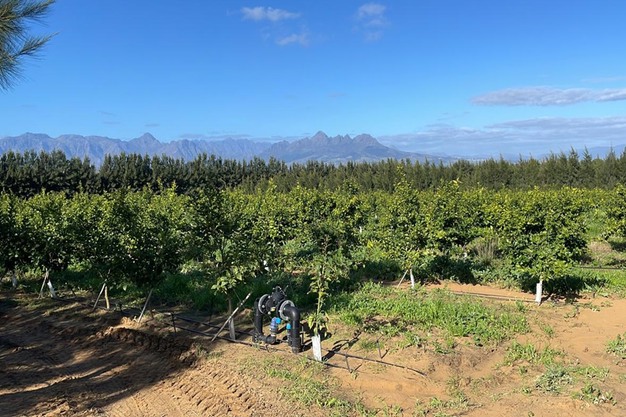
He continues: "During the 2023 harvest the thrips went unnoticed because everyone was telling us 'you don't get thrips in the Western Cape' and by the time December came, we hadn't sprayed for it and all of our fruit was damaged. We actually had a terrible year last year but we definitely made up for it this year because we're on top of our pest monitoring."
The aim is a diversified farm, with over hundred hectares of the farm given over to grazing by their cattle and free-range chickens whose eggs are sold to restaurants, delis and Spar stores in the Western Cape. They are down to 50% of their hen carrying capacity, waiting for many months already for young Lohmann Red laying hens after 2023's severe avian flu outbreak which has pushed up egg prices in South Africa.
Free-range eggs are in high demand and its daily delivery ensures a strong cash flow for weekly running expenses on the farm, nicely dovetailing with the longer time frames of export fruit and wine.
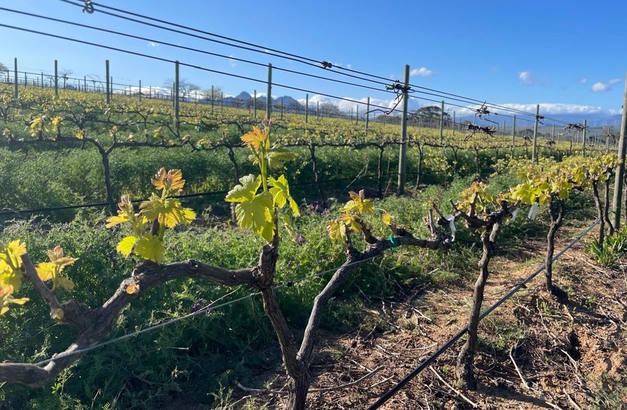
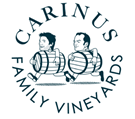 For more information:
For more information:
Francois Alberts
Bluegum Grove
Carinus Family Vineyards
Tel: +27 71 363 6028
Email: [email protected]
https://www.carinusvineyards.co.za/
